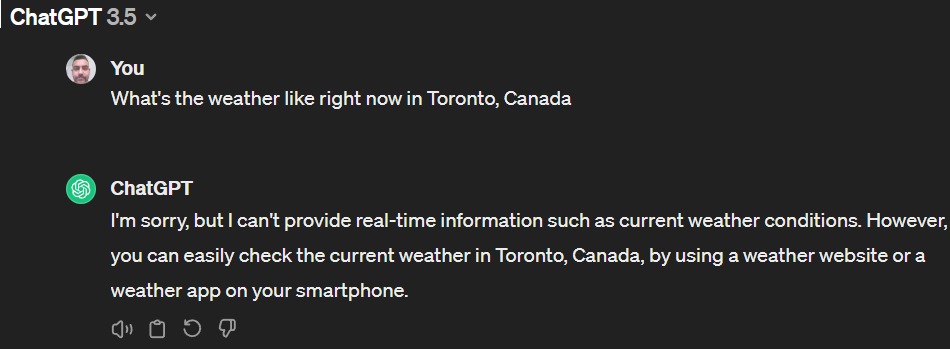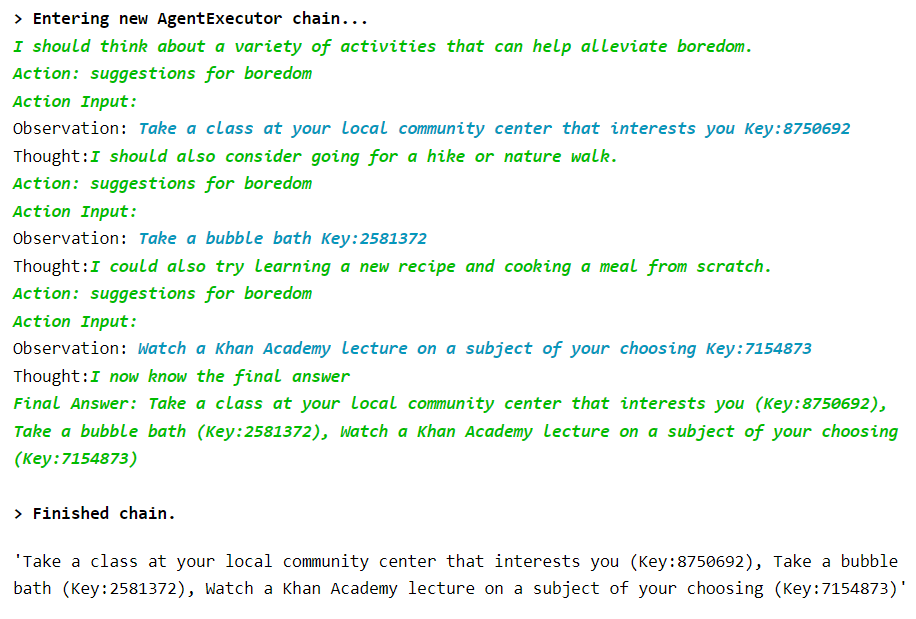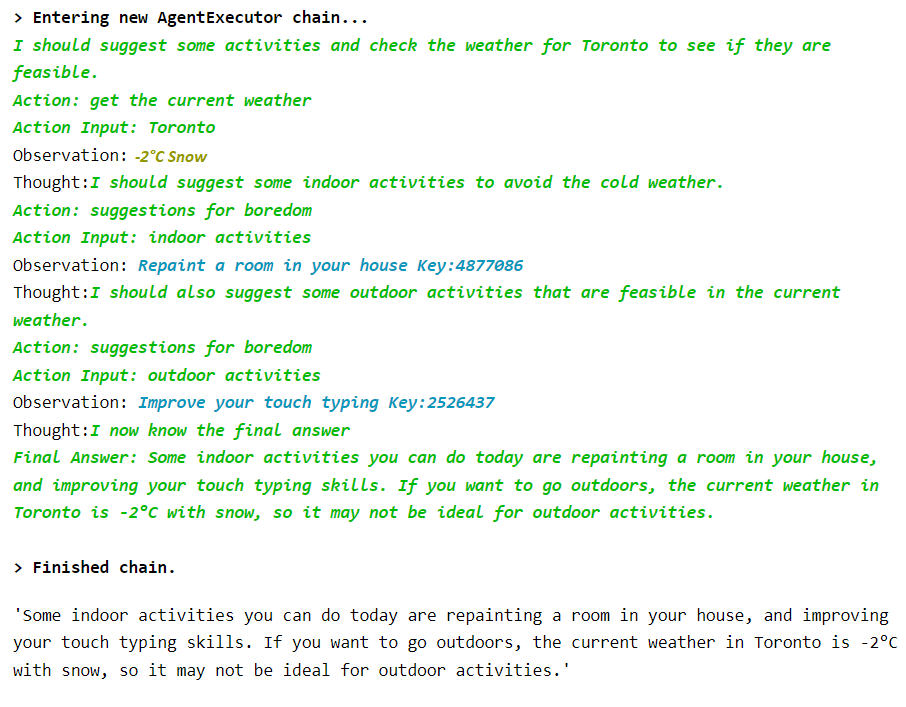custom langchain agents
AI, LLMs and ChatGPT have been all the 🌊 the last 12 months and I haven’t written about it here… until now. Today I want to write about an interesting problem that the langchain can potentially solve.
I’ll assume from here on in you have heard and (hopefully) tried “ChatGPT” yourself 👨💻
The Problem
“A picture is worth a thousand words.” In this case, a picture of words is worth saving me a thousand keystrokes:

One of the reasons ChatGPT can’t give responses based on real-time information because the underlying model was trained with data up to a certain point in time.
Langchain
Enter Langchain. Specifically Langchain Agents.
I’m not going to go into an exposition on them (read the docs 📗📘📙) but I want to show how we can leverage them to do things for us.
At a high level, I’ll create a “tool” 🔨 to do a task. I’ll make this tool available to the LLM via Langchain. When the agent is invoked, it will reason whether to use my tool (or not 🤔) based on my prompt 🗯
My First Tool
Let’s call him Smith 👤
Smith is a Python 🐍 function that will:
- Access a public API that suggests activities to someone who is bored 📡
- Return a random response 🔙
- Parse the response to a string 👷
def Smith():
res = requests.get('https://www.boredapi.com/api/activity?participants=1')
return res.json()['activity'] + ' Key:' + res.json()['key']
Here’s an example of a return:
'Bake pastries for you and your neighbor Key:8125168'
We get a single activity recommendation, followed by a reference 🔑 to verify the message came from the API. See here: link
So our tool Smith() does what we want. The task at hand now is to make Smith() available to the LLM. And that’s where Langchain comes in.
LLMs and Smith
In this section I’ll show very briefly how to include Smith() inside of a Langchain agent call:
from langchain_openai import ChatOpenAI
from langchain.tools import BaseTool
from langchain.agents import initialize_agent
import requests
llm = ChatOpenAI()
class Smith(BaseTool):
name = "suggestions for boredom"
description = "useful for when you need to give suggestions for boredom."
def _run(self, query: str) -> str:
res = requests.get('https://www.boredapi.com/api/activity?participants=1')
return res.json()['activity'] + ' Key:' + res.json()['key']
agent = initialize_agent(llm = llm,
tools = [Smith()],
agent = "zero-shot-react-description",
verbose = True)
That’s about it. Lets try running it with the following prompt and view the output:
agent.run("I am bored, suggest me a few activities. Provide me a key for each activity so I can reference it later.")

💥 Pretty neat, right? This output log shows the reasoning of the agent through Action, Observation, Thoughts steps until it arrives at a final answer. The point here is that it used Smith() to reply because it was determined the tool was the right fit 💯
My Second Tool
Let’s call him Johnson 👤
Johnson is also a Python 🐍 function. He’s made with BeautifulSoup and his job is to scrape google.ca for the current weather for a location of my choosing.
Here he is:
from bs4 import BeautifulSoup
import requests
def Johnson(query: str) -> str:
url = f'https://google.ca/search?q=weather+{query}'
headers = {'User-Agent': 'Mozilla/5.0 (Windows NT 10.0; Win64; x64) AppleWebKit/537.36 (KHTML, like Gecko) Chrome/122.0.0.0 Safari/537.36'}
response = requests.get(url, headers=headers)
soup = BeautifulSoup(response.text, 'html.parser')
temp_elem = soup.find('span', id='wob_tm')
unit_elem = soup.find('div', class_='vk_bk wob-unit')
desc_elem = soup.find('div', class_='VQF4g')
return print( temp + unit + ' ' + desc)
Let’s see what he returns:
Johnson(query = "Toronto");
-2°C Snow
Cool, so learning what we did in the previous example, we can probably use Johnson() to get an answer to the question posed in the beginning of the article.
But why stop there? 🤔
Agent Mania
Let’s see how we can utilize Smith() and Johnson() together 👥 to answer a more interesting question. Like before, we start with the prompt and view the output.
agent.run("Suggest me a few activities to do today, I am bored. If the activities are outdoors, comment on the weather. I am located in Toronto. Comment on whether the weather will be an issue for each activity.")

🤯 😱 🤯 Just take a few seconds and re-read that response log and appreciate what’s happening here 😱 🤯 😱
🔥 Absolutely. 🔥 Positively. 🔥 Wild.
Wrap Up
I hope this short demo of custom Langchain agents will be useful in your own work, the skies the limit 🚀

Langchain already has a set of predefined “tools” for agentic modeling you can use including weather (OpenWeather) and internet search (SerpAPI).
The point here was to show how to do this yourself in case you have custom requirements for which no off-the-shelf tool exists 💪💪🏻💪🏼
Till next time 🍻🙏 !